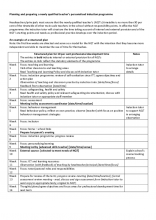Planning the Induction year
During your induction period you should build on what you achieved during your initial teacher training; the Teachers’ Standards reflect the progression and characteristics expected of you as you begin to work more confidently and independently as a teacher.
As an NQT, you are entitled to:
- a reduction of 10 per cent in your teaching timetable in relation to the other teachers in your school. This is in addition to the guaranteed minimum 10 per cent timetabled teaching time for planning, preparation and assessment (PPA) time that all teachers receive.
- an individual programme of monitoring and support, which includes sustained and relevant professional development opportunities.
- the support of an induction tutor in school. Together with your induction tutor, you should periodically review your progress towards meeting the standards, set objectives, and identify and plan for your professional development needs and priorities, including what further experience, monitoring and support you would find helpful.
The year planner will help you and your induction tutor to plan a successful induction. It is a good idea to use the planner as a prompt to plan and schedule meetings with your induction tutor, observations, progress review meetings. You should also identify in advance the dates and activities of NQT central training and any other NQT or CPD sessions and record these in your personal and the school diary.
Suggestions for school-based activities that might form part of the individualised programme
NQTs are entitled to be released for ten per cent of their teaching timetable in order to pursue their school-based programme of induction. This is sometimes taken weekly, while other schools find it easier to timetable it fortnightly.
- If the NQT attends induction specific courses in this time, it can be counted as part of the ten per cent; however if the courses are not specifically part of the induction programme, then they cannot be counted as taking place in the ten per cent release time.
- The time should be timetabled and planned, usually in half termly blocks – this ensures that good use is made of the time, but also allows for flexibility as priorities for development change. The NQT and induction tutor will plan the programme together, taking priorities for development as a starting point.
- This time can be used for many different activities, both at school and elsewhere, which can contribute to the individual’s professional development.
- During the first term NQTs need to get to know their own class and the school really well. Activities may tend to be school based. During the second and third terms, NQTs may be ready to go beyond their own school to find out more about the opportunities available locally.
Useful activities might include:
- time with the induction tutor focusing on: i. Discussions about progress, priorities for the NQT’s development and the programme for the half term ahead, ii. General information about the school – this might include information about procedures for child protection, fire drill/ emergency, handling conflict with pupils or adults, school policy documents, absence procedures, etc.
- spending all or part of one week’s induction time with the SENCO, discussing the pupils in the NQT’s class, deployment of additional adults in the classroom who are supporting children with SEN, and the school’s policies and procedures for children with SEN. Some time might be spent planning for pupils with SEN in the NQT’s class and liaison and joint planning with identified Teaching Assistants/Learning Support Assistants.
- spending all or part of one week’s induction time with the school’s EMAG teacher, discussing the pupils in the NQT’s class, practical strategies and ways to support pupils with EAL, how best to work in partnership with the EMAG teacher, and the school’s policies and procedures for pupils with EAL. Some time might be spent on planning together.
- time with induction tutor or deputy head preparing for the first parents’ evening. This can be a daunting time for NQTs and they need to be prepared to discuss pupils in a sensitive, caring, well-informed and appropriate manner. They also need to know what to do in case of a problem i.e. who to refer the parent to.
- observation of other teachers in the school, including lead teachers.
- time with identified Support Staff - for example, Class Teaching Assistants, LSAs, HLTAs, Learning Mentors etc.
- time to meet with other staff, depending on the NQT’s areas for development. These might include the assessment, English, maths or science coordinators, with whom the NQT could do some shared planning and/or assess pupils’ work.
- a planned visit to observe a teacher in the same year group at a nearby school.
- time to explore local places of interest which might support the curriculum.
- time with their induction tutor or deputy head planning a school trip together. It is important for NQTs to do this with someone experienced when they plan their class’s first trip outside the school.
- team teaching.
- attendance at courses that are appropriate to the NQT’s focus areas.
- working with a consultant, advisory teacher or advanced skills teacher on an appropriate focus area.
- time to discuss report writing with an experienced colleague and to write annual reports for pupils.
Please note that this list is not exhaustive and that there will be many different ways of working, depending on the development priorities of the individual NQT.
Last updated: 27 January 2020

